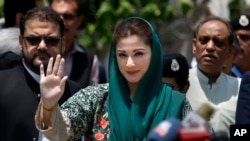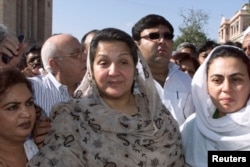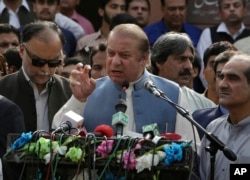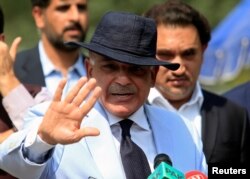A by-election this week in Pakistan's second-largest city, Lahore, shows undercurrents of change and possible upheaval in the ruling party that could impact general elections next year. A low voter turnout also suggests that governing and opposition parties alike have an uphill battle to sell their narratives to the public.
Sunday's election in the country's most populous province, Punjab, was held to fill the seat vacated by former prime minister Nawaz Sharif, who was barred from public office in July.
The investigation that drove him from office began after the names of his three children appeared in the Panama Papers, a trove of documents uncovered by the International Consortium of Journalists showing how corrupt politicians or criminals around the globe launder or hide their wealth. Sharif and his supporters argue that the judgment was influenced by Pakistan's powerful military, which has a long history of interference in the country's politics.
The by-election was won by Sharif's wife, Kulsoom Nawaz, who ran up a 14,000-vote victory margin against her most serious opponent, Yasmin Rashid of Pakistan's second-largest opposition party Pakistan Tehreek-e-Insaaf or PTI.
Succession woes
Th election was considered the public debut for Sharif's 43-year-old daughter Maryam Nawaz, who ran the campaign on behalf of her father's Pakistan Muslim League party almost single-handedly.
Her father was in London with her candidate mother, who was undergoing treatment for throat cancer diagnosed late last month. Her uncle, Shahbaz Sharif, the powerful chief minister of Punjab province, as well as his son, Hamza Shahbaz Sharif, chose to be outside the country during the crucial campaign period. Many took this as indication of a succession struggle within a family that has survived multiple ousters and a forced exile.
The younger Sharif brother was widely believed to be next in line for party leadership until the daughter arrived on the scene. While this campaign marked the first time she has been out on the streets politicking, she has been active behind the scenes and was said to have controlled the party's media operations while her father was prime minister.
Shahbaz Sharif is also believed to favor a conciliatory approach toward the military as opposed to his brother, who is upset at his third ouster from power and is said to be ready for a showdown.
"Maryam won and Shahbaz lost," said Nusrat Javed, a seasoned journalist and native of Lahore. In this election, according to Javed, Maryam was competing not just with the opposition but with powerful members of her own party, including her uncle and the former interior minister Nisar Ali Khan. The by-election victory, Javed suggested, would be a cause for concern for her opponents.
Her critics, however, say that Maryam failed to generate the same kind of voter enthusiasm as her father. Her mother, for whom she campaigned diligently for weeks, received 30,000 fewer votes, or just two-thirds of what her father received in the same constituency four years ago.
Corruption vs. conspiracy
Sharif and his supporters had framed the vote as the public's verdict on his leadership and a repudiation of the Supreme Court judgment.
"On one side there was Pakistan Muslim League and on the other side there were all the forces that repeatedly attack elected prime ministers," Maryam Nawaz said to cheering supporters after her mother's victory. She said the Lahore constituency, a longtime PML stronghold, "took that bullet on its chest."
Sharif's previous two terms as prime minister were also cut short, the first by a presidential decree on charges of corruption, believed to be at the behest of the military, and the second by a military coup led by General Pervez Musharraf, who exiled him to Saudi Arabia with other family members.
This time, his party strongly suggested, without putting it into words, that the military used the judiciary as a tool.
"Today, you not only competed with those who were visible in the field, but also those who were invisible," Maryam Nawaz told party supporters.
The opposition, led by internationally acclaimed cricketer turned politician Imran Khan, framed the election as a vote against corruption and for the rule of law.
One of the leading plaintiffs against Sharif in the court case, Khan told the voters Sharif had looted the national treasury to fill his family's coffers.
"The streets and alleys are resounding with chants that Nawaz Sharif is a thief," had become the party's favorite campaign slogan.
While Maryam Nawaz declared her mother's victory as a reaffirmation of Sharif's support, Khan's party said the reduction in the margin of victory on its home turf, from 40,000 votes in 2013 to the current 14,000, showed the public was turning away from the ruling party.
Voter apathy
Despite the fervor created by both parties and almost non-stop media coverage of the campaign, the voter turnout was significantly lower than in 2013.
Ahmed Bilal Mehboob, president of the Pakistan Institute for Legislative Development and Transparency, a non-partisan think tank, said the turnout was 33 percent compared to 51 percent four years ago.
"This was a vote of abstention," he said, adding that it was clear that the voters did not buy the narrative of either party.
The by-election was considered a test of voter attitudes ahead of general elections next year. The lack of interest, Mehboob said, "raised a question mark on the appeal of the various political parties."







